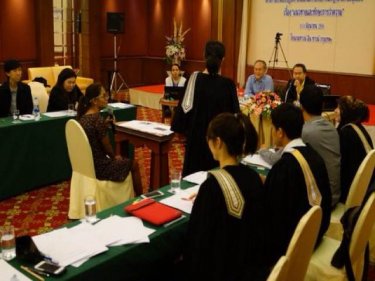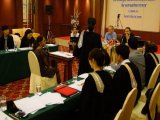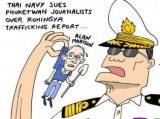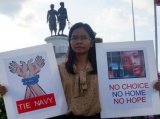|
|
Click a thumbnail to view more photographs
Phuket Trial of the Century Coming Soon
Monday, June 15, 2015
PHUKET: With intense interest building in the coming trial of two Phuket journalists, Thailand's Human Rights Lawyers' Association held a mock hearing in Bangkok yesterday.
The ''trial'' came at the conclusion of a four-day seminar that made the Royal Thai Navy prosecution of Australian Alan Morison and his Thai colleague, Chutima Sidasathian, a special study.
New-generation human rights lawyers from all over Thailand were encouraged to represent a Navy officer and three policemen who are scheduled to give evidence against the Phuketwan pair from July 14.
The verdict: well, the real trial could still be prevented if the Royal Thai Navy and Prime Minister Prayuth Chan-o-cha wish to save Thailand's reputation from being brought further into disrepute over the issues of boatpeople and media freedom in the country.
''Muslim nations especially will be interested to observe this trial,'' Morison, the editor of Phuketwan, said today. ''We believe loyal Thai Muslims will also be watching closely.
''With religious and ethnic intolerance in Burma now clearly the root cause of the whole region's problem, seeing Thailand work swiftly towards a transparent and permanent solution will be what the world wants to see happen.
''Discrimination against minorities and the media is not the way ahead for Thailand.''
Morison said he and Khun Chutima remained open to any attempt to settle the ''unjust and misguided'' action.
If there is no mediation, observers from the region's Muslim nations, international news outlets, representatives from Thai Muslim organisations, students from the major universities, Phuketwan readers and civil rights supporters are expected to make next month's hearing at Phuket Provincial Court the holiday island's ''trial of the century.''
The latest US State Department's Trafficking in Persons report, which in 2014 downgraded Thailand to lowest-level Tier 3 and mentioned the Phuketwan prosecution as one of the reasons, is likely to be released any time now.
Morison and Khun Chutima briefed ambassadors and envoys from the 28-nation European Union about their case in Bangkok on Friday with British rights advocate Andy Hall, who also faces a series of cases in which the Computer Crimes Act and criminal defamation laws are being misused.
Declaration of Interest
Phuketwan journalists Chutima Sidasathian and Alan Morison are being sued by the Royal Thai Navy for criminal defamation and a Computer Crimes Act count over a 41-word paragraph republished from a Reuters series on Burma's Rohingya boatpeople.
The series won a Pulitzer Prize. The paragraph did not actually mention the Royal Thai Navy.
The service's precedent-setting military-versus-media action predates last May's Army takeover in Thailand. A trial resumes in July. Maximum penalty for the pair is seven years' jail.
Morison and Khun Chutima remain on bail of 100,000 baht each, provided by the Andaman Community Rights and Legal Aid Centre, based in Trang province. Other groups and organisations have also offered financial help.
Most of the legal costs of the case are being met by the London-based Media Legal Defence Initiative.
In Thailand, a group of more than 10 lawyers have teamed up to provide legal counsel. They include the Human Rights Lawyers' Association, iLaw and SR Law.
WATCH How Trafficking Works
Phuketwan Investigative reporter Chutima Sidasathian, still being sued for criminal defamation over a Reuters paragraph: ''It's worse and worse, day by day. Nobody cares''.
http://journeyman.tv/67116/short-films/rohingya-hd.html
LISTEN The Rohingya Solution
A tragedy almost beyond words has been unfolding in Thailand, where a human smuggling network is thriving with the full knowledge of some corrupt law enforcement officers. Alan Morison of Phuketwan talks to Australia's AM program.
http://www.abc.net.au/am/content/2015/s4231108.htm
|
Comments
Comments have been disabled for this article.

The people and organisations giving you financial and legal support to defend the charges deserve the sincere gratitude of all of us!
You correctly say that religious and ethic intolerance in Burma is the root cause of the whole region's (current) problem. However, it should not be forgotten that plenty of Muslims in the region have been involved in the slave trade, human trafficking and in holding refugees to ransom. The traffickers include Muslim Rohingyas, Muslim Bangladeshis, Muslim Thais and Muslim Malays.
It is not just Buddhists who are profiting from the slave trade and within Thailand it is not just Muslims who are the victims. Buddhist Thais, Buddhist Cambodians and Buddhist Burmese have all been victims of slavery in Thailand for years.
Posted by
Ian Yarwood
on
June 15, 2015 09:14
Editor Comment:
There have been no Buddhists - apart from perhaps a trafficker or two - on the boats that have been carrying people to ransom and torture in southern Thailand for the past decade. Those victims are all Muslims.

Dear Ed
Your comment in reply is noted.
Phuketwan has been writing extensively on the current diaspora of the Rohingya who are Muslims. I paraphrased one of your quotes and inserted the word "current" within brackets ( ).
The point I was making in the last paragraph of my earlier comment is that Buddhists are also victims of the wider slave trade in Thailand. There are plenty of Buddhists who work as slaves on Thai fishing vessels or in Thai rubber plantations or Thai factories or Thai brothels. These Buddhist slaves come from within Thailand and from neighbouring countries including Cambodia and Burma.
I hope this clarifies one of the points I was trying to make.
I am also of the view that before any reasonable Buddhists or reasonable Muslims pay too much attention to the rants of religious extremists (whether Muslim or Buddhist) they should note that within Asia "followers" of both religions are represented amongst the villains and the victims.
Posted by
Ian Yarwood
on
June 15, 2015 09:46
Editor Comment:
Our interest in smuggling-trafficking really began with the container load of Burmese (probably Buddhists) in 2008 heading for Phuket when more than 50 perished in horrible circumstances, from lack of oxygen. We have also encountered Burmese working as ''slaves'' on boats and Burmese women kept prisoner as sex slaves. But the really large numbers abused in Andaman Sea trafficking, both from Burma and Bangladesh, are Muslims. That fact has not escaped Turkey, Pakistan, and Afghanistan, among others. It should also not be overlooked by the government of Thailand. The downtrodden and deprived are so often subject to abuse. It is no surprise that the Muslim world is looking on closely for the right kind of reaction.

Quote "Discrimination against minorities"
I must say on behalf of all foreigners that live in Thailand or even visited the country, the descrimination that prevails, is very shocking indeed. I have accepted with a certain degree of relunctance, that it will take some while for attitudes to change, both at root level , but also on a legislative perspective.
Naturally our plight with the authorities is somewhat insignificant compared to that of the Rohingyan people, and their struggle. However, I feel that all forms of descrimination is inextricably entwined, that somehow it seems acceptable for Thailand to behave in such a repugnant manner, that such attrocities have remained unchallenged, until now.
The fact that this trial is going ahead at all, surely highlights the shortcomings of a draconian system. It also demonstrates that perhaps the country is still prepared to cut it's nose off despite it's face, regardless of the consequences. The system IMHO is therefore broken, and urgently needs to be reformed.
The trial of the Phuketwan reporters, which has certainly gained international media attention, will be monitored closely, and the outcome I'm sure, will determine Thailand's fate.
Posted by
reader
on
June 15, 2015 11:57

even though things are going wrong many times on phuket, like ... taxi, tuktuk, minivan, jetski, parasail, umbrella, chair, mat, parking, drowning, lifeguard, landtitle, license, registration, extortion, flooding, scamming, skimming, timeshare, commission, price, safety, twooclock, beating, cctv, traffic, plastic, garbage, condo, visa, immigration, jellyfish, blackwater, river, waterfall, encroachment, loris, elephant, pingpong, bigfightofthemonth, seawalking, captain, insurance, investigation, autopsy, weapon, blockade ... in the end all these have been addressed and solved ... in online comments by farangs!
Posted by
SirSomChai
on
June 15, 2015 13:02

Hi Editor
You mentioned in one of your comments to me that Turkey, Pakistan and Afghanistan have noticed that the victims caught up in Andaman Sea trafficking are Muslims.
I would ask any aggrieved Muslims from those countries to certainly look at what is happening in Burma but also look very closely at slavery and trafficking in their own countries and in the region.
According to the 2014 Global Slavery Index, the total estimated number of slaves in the world in 35.8 million and the results for some of the countries in the region are as follows:
Pakistan Rank 6 (low rank numbers are worse); estimated number of slaves 2,058,200; proportion of population enslaved 1.13%.
Cambodia Rank 14; 155,800 slaves; 1.0292%
Thailand Rank 44; 475,300 slaves; 0.7903%
Malaysia Rank 56; 142,600 slaves; 0.48%
Bangladesh Rank 59; 680,900 slaves; 0.4348%
Myanmar Rank 61; 231,600 slaves; 0,4348%
Afghanistan Rank 62; 132,800 slaves; 0.4348%
Turkey Rank 105; 185,500 slaves; 0.2476%
Attacks on media freedom in any country allows corruption and crimes of all sorts to flourish including slavery and human trafficking.
It can be exceptionally difficult for any investigative journalist to report on suspicious activities when faced with the possibility of unjust charges.
The worst aspect is that convictions on criminal defamation and Computer Crimes Act charges in Thailand can result in sentences of many years in prison on a diet of rice and weevils. How on Earth can Thailand truly tackle human-trafficking while media freedom is under such serious threat?
Posted by
Ian Yarwood
on
June 15, 2015 14:25

@ reader
Very well said. I fully agree with you.
Discrimination is an integral part of everyday life in Thailand. The diabolical opposite of the tolerance Buddhism teaches and Thais claim to adhere to.
Posted by
Herbert
on
June 15, 2015 16:30

'I would ask any aggrieved Muslims from those countries to certainly look at what is happening in Burma but also look very closely at slavery and trafficking in their own countries and in the region." Ian Yarwood
Indeed, and it appears that Muslims, Buddhists, Jews, Christians et al are more than capable of employing double standards.
Therefore, under the labels, we are all more similar than many of us would choose to believe, in order to justify and perpetuate a racist agenda.
Signed,
Self-fulfilled Prophesy
Posted by
farang888
on
June 16, 2015 00:22

Ian,
just would like to point out, that Global Slavery Index is not real world metrics, but is merely a result of very abstract extrapolation:
what they do, they take just 7 countries' real-world surveys per year, in total such surveys exist for only 19 countries, and some unidentified secondary sources for 58 countries used;
and for the rest - 100 countries out of 167 ranked in the GSI, it is only a pure and abstract mathematics.
I wouldn't use the GSI to rank countries or to make any substantive decisions or conclusions, except on 7(19) countries that have been surveyed in real world.
Still, it doesn't prevent us to address particular problems in particular countries or regions.
Posted by
Sue
on
June 16, 2015 06:36

I agree Sue,
when I saw the figures for Bangladesh, Myanmar and Afghanistan all being of equal with 0.4348% or to the nearest 1 in 10,000 it also appeared to me the figures from the Global Slavery Index were just rough estimates.
Posted by
Fat Old Ugly Fellow
on
June 16, 2015 07:37

Good morning Sue and FOU Fellow!
Thank you both for reading my comment. We never really know how many people read our little contributions.
Sue, it must be said that you have also done a reasonable amount of research on the global slavery index which is quite a credit to you.
I am generally aware of difficulties in creating the Global Slavery Index but I think it is fantastic that a serious effort has been made to MEASURE the problem. It was actually Bill Gates who advised the Australian billionaire philanthropist, Andrew "Twiggy" Forrest that if he wanted to tackle modern day slavery then he must be able to measure the problem and the effectiveness of programs to reduce or eliminate it.
It is really obvious to anyone who thinks for just a moment that the Index is based on estimates. Some estimates might be close to the mark while estimates for some countries might be wide of the mark.
One plainly obvious problem is that slave owners and slave traders are not the most helpful people when it comes to answering questions on how many slaves they own.
I believe that even with its shortcomings the Global Slavery Index is a fabulous tool to help demonstrate to people just how huge modern day slavery is.
I spend a reasonable amount of time writing to Australian politicians, their staff and to foreign politicians and their staff about: modern day slavery; the slave trade in Thailand; and the charges faced by Phuketwan journalists.
The Global Slavery Index is just one of many tools at my disposal. I also use Youtube clips and a huge number of news reports and papers that are published on the net.
A common response is "I knew it was a problem but I just did not know the magnitude of the problem."
Regards
Ian Yarwood
Solicitor - Perth, Western Australia
Posted by
Ian Yarwood
on
June 16, 2015 09:48
Editor Comment:
It's great that efforts are being made to quantify slavery but the most immediate need is a free media to cover trafficking. Needless to say, we believe the case against PW has been brought for all the wrong reasons. We look forward to an explanation from the secretive Royal Thai Navy, which has comprehensively failed to stop trafficking over the past 10 years.

I think "trial of the century" is over stating it a little .....
Posted by
Discover Thainess
on
June 16, 2015 10:49
Editor Comment:
''Phuket trial of the century'' . . . absolutely true. Please stop your misinterpretations.

"..the most immediate need is a free media to cover trafficking."
I imagine that over the past decade there would have been many journalists with information and leads about who was involved in trafficking but they were inhibited from publishing anything because of the country's criminal defamation laws.
It is also easy to imagine that a media in chains helps slave traders put shackles on and keep shackles on vulnerable people.
A free media does hold people accountable for their actions or lack of action as the case may be. A free media can make people think twice before engaging in illegal activities. Without a free media crime, corruption and incompetence are free to flourish.
Coming from my cultural background I do not believe that anyone can be patriotic unless they also believe that their country deserves the freedom that a free media can help create and protect.
I think there are huge numbers of people who would look forward to hearing some explanations from the Royal Thai Navy.
Posted by
Ian Yarwood
on
June 16, 2015 11:33
Editor Comment:
We have always sought to correct errors in the system and not target individuals but clearly, some individuals within the system have targetted PW. The media in Thailand should be pulling back the ''Royal Thai Navy'' curtain and asking who the individuals are and what their motives are. These are the questions police should have asked before simply passing on an unjustifiable case to the prosecutor. No doubt the individuals will be bold enough to speak out. They should not remain anonymous. That's inappropriate for a democratic Thailand.

Hi Discover Thainess
Yes, Ed did refer to the holiday island's trial of the century and I think that sounds right.
I cannot promise that I will still be around at the end of this century to compare notes with you but I doubt there will be any bigger or more publicised cases on Phuket this century. The case is relatively simple but it will be huge.
I am just grateful that I am not the unfortunate lawyer who has been instructed to appear in court for the Navy. Unfortunately for him or her it will be the highlight their career.
In reality lawyers do tend to have tough hides and when given a difficult case a lawyer typically tells their client that the client should expect to lose. Some clients of course do not take their lawyers' advice.
Ian Yarwood
Solicitor - Perth, Australia
Posted by
Ian Yarwood
on
June 16, 2015 12:00

Lets hope it doesn't result in the same cockup as Phukets biggest trial to date, 10% beach zones and jet skis!
Posted by
MoW
on
June 16, 2015 12:04

The iron curtain of the Royal Thai Navy?
Well, so far the Berlin Wall has come down.
Posted by
Ian Yarwood
on
June 16, 2015 12:14

Ian,
The equal to the 'wall has come down' in this case may be 'the bilge pump lacks sufficient capacity' or ' we are in deeper water than we expected' or 'we just hit rock bottom' or 'we are not concerned about damage from enemy fire, we are quite capable of sinking ourselves'.
Posted by
MoW
on
June 16, 2015 15:55

@ Ian Yarwood
Maybe you havent followed news over the past 15 years in Phuket, but as per my other comment, some far more important trials which have gained far more global media coverage, just take Lee Aldhouse for one quick example.
Yes, PW has been "reporting" on nothing else for months now, and SCMP & a couple of others have done brief editorials, but nothing compared to the global coverage of a british thug murdering an American hero in Phuket.
Reality check absolutely needed !
Posted by
Discover Thainess
on
June 16, 2015 18:20
Editor Comment:
Your judgement isn't great, DT. Murders are sometimes memorable but they quickly fade with time. The PW case will receive coverage across the Muslim world as well as in the West and be a topic for study in Thai law textbooks in years to come. It will be the ''Phuket trial of the century''.

(moderated)
Posted by
james
on
June 16, 2015 19:00
Editor Comment:
Intelligent, articulate readers and their responses are welcome, Andy. That lets you out.

Hi Discover Thainess
The murder of 23 year old Dashan Longfellow was indeed a tremendous tragedy for him and for his friends an family. Please do not think for a moment that I would try to diminish the significance of his loss on the people who were close to him and who hold cherished memories of him.
However, the Phuketwan story and upcoming trial are in a completely different league to the story of a British thug murdering a marine.
Phuketwan had been covering the murders, deaths, rape and torture of thousands of Rohingya victims. This industrial scale crime wave has caused problems for several countries in the region and has caused problems between countries.
A free media is a powerful force in discouraging crime and in holding people to account. A free media can help prevent genocide. It can help prevent war. It can help prevent corruption.
Your comments were made one day after the 800th anniversary of the Magna Carta by the way.
There is no free media in Burma DT. It is the land where Buddhist monks are able to brainwash the mobs that burn students alive and murder scores of others.
I can assure you DT that I am very much in touch with reality. The Phuketwan trial is shaping up to be Phuket's trial of the century.
Posted by
Ian Yarwood
on
June 16, 2015 22:02

In the court of international public opinion it is the Royal Thai Navy that is forcing Thailand to stand trial on media freedom and human rights.
Posted by
Ian Yarwood
on
June 25, 2015 13:54

Did anyone notice that it is George Orwell's birthday today?!
These charges would be a huge disappointment for him if he were alive to watch what is happening.
Posted by
Ian Yarwood
on
June 25, 2015 17:47

Dear Ed
The influential and highly respected Melbourne barrister, Julian Burnside AO QC has been tweeting in support of you and Khun Chutima and linked a tweet to a one page write-up on his website.
http://www.julianburnside.com.au/journalists-in-thailand-facing-jail-for-mentioning-thai-naval-forces/
https://twitter.com/julianburnside
He has written in support of the two of you and also refers to the 4 Corners documentary "Journey Into Hell."
At last count he had 74.7k followers on twitter and many of these are senior politicians, journalists, intellectuals and an assortment of other decision-makers.
I have noticed that other influential people in Australia have been tweeting about the Rohingya and the 4 Corners documentary in particular.
Ian Yarwood
Solicitor - Perth, Western Australia
Posted by
Ian Yarwood
on
June 26, 2015 12:01
Editor Comment:
Thanks, Ian, for your advocacy and encouragement. We've just reported on the personal tragedies we've both experienced this week and will be delighted to report more widely on the efforts of Julian Burnside AO QC on our behalf. It will not be long before the Thai people are equally well-informed and disturbed by these sad efforts to silence the media.

Julian Burnside is certainly a highly intelligent and compassionate individual. It is brilliant that he has added Phuketwan to the worthy causes he speaks up for.
Posted by
Matt William
on
June 26, 2015 17:09

AN ATTEMPT TO PREDICT THE OUTCOME OF THE ROYAL THAI NAVY v PHUKETWAN JOURNALISTS
As the trial dates of 14 -16 July 2015 approach, people have been trying to predict what might happen over the next two weeks. For what it's worth, this is my attempt to see two weeks into the future.
I predict that the journalists will prevail and that they will do so on one of those famous Thai ''technicalities'' that will allow The Royal Thai Navy to save face and that will also diffuse all the unnecessary drama we have witnessed. I am not too concerned with which ''technicality'' the Phuket Provincial Court might find most attractive but I can outline a few possibilities.
I should stress that I am not privy to any advice from or discussions with the journalists' Thai legal team. In addition, my discussion of the reasons why I think the journalists will prevail is fairly limited but the publication by David Streckfuss (referred to below) does go into greater detail of Thai defamation law.
CLARIFYING SOME MATERIAL FACTS
Those readers with limited or no knowledge of the background facts would be well served by reading part of the open letter from Lawyers' Rights Watch Canada (LRWC) dated 5 January 2015 on its website and republished on 7 January 2015 on Phuketwan under the headline: Judicial Harassment in Thailand and Consular Protection of Mr Alan Morison. It is one of the few articles I have read on this matter that is really accurate in the reporting of the background facts.
Unfortunately, I have read many press releases, media reports, blogs and comments from readers of Thai websites that contain factual errors of varying degrees of importance. One particularly serious error in the media reports seems to have occurred when media outlets paraphrase each other's stories.
Many months ago, I read one disappointing letter from the Australian Department of Foreign Affairs and Trade to Jenny Braddy (one of Alan Morison's sisters) that contained several misleading statements. Anyone who reads the LRWC article will also observe that, according to Jenny Braddy, the Australian Foreign Minister incorrectly asserted that British human rights activist, Andy Hall had his passport returned from a Thai court because he made an apology, when in fact he never made any apology. Andy Hall successfully defended a charge of criminal defamation in the Prakanong Court, Bangkok.
Some of the comments from readers of websites seem insightful but others are wildly inaccurate when making statements of fact.
Here is an example of an obvious but unimportant error from a reporter on one website: ''Morison and Khun Chutima had applied for a grant of $100,000.00 to help fund their bail.'' Their bail was 100,000 baht not anything like $100,000.00. http://www.thecitizen.org.au/news/australian-journalist-fears-rough-justice-thai-defamation-case
Here is another obvious but unimportant error from freelance journalist, Michael Sainsbury that was published on Phuketwan on 1 July 2015: ''Foreign Minister Julie Bishop raised the case with Prayuth on her visit to Thailand in April''. In fact, Foreign Minister Bishop was not in Thailand in April but she did raise the case with the Thai Deputy Prime Minister on 8 May 2015. (General Prayuth is the Thai Prime Minister not the Deputy PM).
Arguably the most misleading statement I have seen in a press release came from Human Rights Watch (''HRW'') on 16 April 2015: ''The charges centered on a paragraph in the Phuketwan online newspaper on July 17, 2013, that cited a Reuters investigative report alleging that some navy officials ''work systematically with smugglers to profit from the surge in fleeing Rohingya,'' and that they earn about 2,000 baht (US$63) per Rohingya ''for spotting a boat or turning a blind eye.''
Unfortunately, this statement has been picked up copied and paraphrased by other news services including unfortunately Fairfax publications in Australia. The error then became like a virus.
The charges against the journalists are centred on one paragraph ''and one paragraph only - but HRW quoted from two paragraphs. The relevant paragraph did not refer to ''navy officials'' at all despite what was written by HRW. The relevant paragraph starts with the words ''The Thai naval forces'' which is an exceptionally vague term used by Reuters. In the context of the series of reports from Reuters ''Thai naval forces'' can include ''militia commanders'', Thai naval security forces and Thai Marine Police and certainly does not necessarily mean ''The Royal Thai Navy'' or ''navy officials'' (HRW's words). Nowhere in the relevant paragraph does the term ''navy officials'' appear and in fact that term appears nowhere in the Phuketwan story of 17 July 2013.
I am not merely splitting hairs. The precise words in the paragraph in the Phuketwan story are of vital importance. The relevant paragraph referred to ''Thai naval forces'' and not to ''The Royal Thai Navy.''
The bottom line is that in the relevant Reuters paragraph, republished by Phuketwan, Reuters did not point the finger at The Royal Thai Navy. This is the most fundamental and important fact to understand when trying to predict the events of the coming two weeks.
Reuters did (correctly or incorrectly) directly point the finger at The Royal Thai Navy in a subsequent story it published on 5 December 2013, some five months later. Most readers will be aware that despite this The Royal Thai Navy has not pursued Reuters or any other news services, just tiny Phuketwan.
It should not be lost on anyone that the conduct of The Royal Thai Navy has been dubious to say the least. It comes across as being a bully that wants to pick on the little guy (Phuketwan) but wishes to avoid a bigger target such as Reuters. It should also not be lost on anyone that an appropriate course of action for the police and prosecutors to take would be to investigate the reason(s) why The Royal Thai Navy targeted Phuketwan in particular.
It is worth noting that Phuketwan did publish a reply from The Royal Thai Navy three days after the story of 17 July 2013. Phuketwan also published a favorable story regarding The Royal Thai Navy on 18 December 2013. These actions would be important in a Western legal system (demonstrating an absence of malice) but these actions are even more important in the Thai legal system where the intentions of the person making the allegedly defamatory statement are very important.
On or about 26 June 2015 Alan Morison received a letter from the office of the Thai Prime Minister advising that the Attorney General's Office would not be requested to drop the Computer Crimes Act charges. Therefore, it seems almost certain that the case will proceed to trial on 14 July 2014.
I have seen comments from members of the public suggesting that Alan Morison might call for an adjournment. I believe this is most unlikely. Had he wished to avoid the trial he could have stayed in Australia earlier this year but he returned to face the charges. In addition, it is in his interests to bring the matter to a head so that he and Khun Chutima can get on with their lives.
95% CONVICTION RATE
According to David Streckfuss (the author of the publication 'Truth on Trial in Thailand') some 95% of criminal defamation charges result in convictions. This is a frightening statistic and possibly the most sobering aspect of the situation that the journalists find themselves in.
Few things are certain except in hindsight. However, for the reasons I shall outline below I believe that the odds are in favor of the journalists.
REASONS WHY THE JOURNALISTS SHOULD PREVAIL
In British based legal systems local councils and government bodies cannot sue for defamation although individuals employed by them can do so. It would appear that in Thailand the situation is not entirely clear. It might be possible for a branch of the armed services to bring a criminal defamation charge.
I note that this seems to be a test case as to whether or not a branch of the armed services can bring criminal defamation charges and charges under the Computer Crimes Act 2007. (In the Thai language there is no distinction between the singular and the plural so the Act is sometimes referred to as the Computer Crime Act 2007)
Streckfuss does discuss a few cases in which the Courts considered which groups of people could bring criminal defamation charges. The issue of whether or not The Royal Thai Navy can sue will be tangled up with the whole notion that the words ''Thai naval forces'' and whether those words can include or mean persons outside the Royal Thai Navy. The larger and less well defined the group is the more likely it is that the Court will decide that the ''plaintiff'' is unable to sue.
It is unclear but it is quite possible that the Court will decide that The Royal Thai Navy cannot sue at all. Alternatively, it might decide that The Royal Thai Navy cannot sue in these special circumstances where the correct plaintiff might include Thai Marine Police, militia commanders etc.
I would imagine that the Court would prefer to leave the various branches of the Royal Thai armed services with the right to sue but that it might be attracted to a decision that The Royal Thai Navy cannot sue in these specific circumstances where a very vague term is used. A favorable result could thereby be achieved for the accused without creating an unfavourable precedent for the armed services. (Although I understand that the concept of ''precedents'' is not as important in Thai law as it is in British law) The charges could then be dismissed.
Should the Court find that The Royal Thai Navy is able to sue even in these circumstances then the obvious argument for the journalists is that plaintiff was not expressly named and that the plaintiff was not referred to by implication. This would appear to be a strong argument that the offence of defamation had not been established by the plaintiff. If the Court finds favor with that argument then the charges should be dismissed.
I refer to the excellent report of the Brisbane barrister, Mr Mark Plunkett concerning the criminal defamation case of Natural Fruit Co Ltd v Andy Hall.
http://www.ictur.org/Eng/Plunkett.html
Although the charge against Andy Hall was dismissed on a ''technicality'' (prosecution failing to follow the correct interrogation procedure) Mark Plunkett did highlight the fact that Andy Hall did not name the Natural Fruit Co Ltd in the Al Jazeera interview that was the subject of the charge.
A further argument available to the journalists is that in the relevant paragraph (and indeed in the whole story) they did not accuse anyone of doing anything immoral or illegal. They merely quoted from a report from an internationally respected news service. This is the sort of thing that journalists do all over the world every day of the week.
Journalists can often rely on a qualified privilege in some jurisdictions provided there is no malice in the reporting.
As mentioned above, the intent of the journalists is more important in Thailand than it is in other jurisdictions. Streckfuss does discuss this in his publication. There is ample evidence in the Phuketwan articles of 20 July 2013 and 18 December 2013 and elsewhere to demonstrate that the Phuketwan journalists had no intention to defame The Royal Thai Navy.
I can think of one or two additional ''technicalities'' that might favor the journalists but it might be inappropriate for me to commit these to writing in a forum that the plaintiff's representatives might read.
In the unlikely event that the Court decided that the journalists had identified The Royal Thai Navy in the relevant paragraph and that the paragraph was critical then the journalists would be obliged to prove: (1) that the statements (as interpreted by the Court) were true; and (2) that the journalists acted in the public interest and not for the purpose of embarrassing The Royal Thai Navy. Obviously, it could prove extremely difficult for the journalists to satisfy the first of those requirements given that they were not the original authors of the paragraph or the story.
OTHER MATTERS
The journalists have been charged under s 14(1) of the Computer Crimes Act 2007. The meaning of the Act (and that subsection) is vague and has been described as such by many commentators. The subsection states that it is an offence to ''import into a computer system'' false computer data in a manner that is likely to cause damage to a third party or the public.
The criminal defamation trial of Natural Fruit Co Ltd v Andy Hall lasted approximately one week in September 2014. As it transpired most of the evidence adduced at the trial was irrelevant given that the case was dismissed on the grounds that the prosecution had not followed the correct interrogation procedure.
In the circumstances, the Prakanong Court did not make any adverse findings against the plaintiff. Andy Hall won but it was on a technicality, which allowed the Natural Fruit Co Ltd to ''save face.'' The result was a victory for the defendant but in a sense it was also a bit of an anti-climax.
Andy Hall's case received an enormous amount of international publicity which in my opinion did not hurt his interests at all.
The Phuketwan case has also attracted considerable international interest. Of course, every case is important but the presiding judges will be motivated to reach a just decision based on the evidence that is brought before them.
To state the obvious, it would be disastrous for Thailand if the journalists were found guilty of any of the offences. It would also be disastrous for the journalists if they were sent to jail.
I cannot realistically see either of those things happening though. I see a big anti-climax coming following a couple of weeks of widespread interest.
An appropriate and just decision would be that the case is dismissed on one of the technicalities outlined above. In the circumstances, there would be no adverse findings against the plaintiff. The journalists would get their lives back and The Royal Thai Navy would not ''lose face.''
However, The Royal Thai Navy will look like a bully and the world will take considerable notice of Thailand's defamation laws.
In the circumstances it would be very reasonable to ask why The Royal Thai Navy laid the charges in the first place. There can be several reasons but one reason might be that the relevant personnel probably thought that little Phuketwan would simply cave in and/or close up shop - the same way most powerless Thais do when confronted with a powerful opponent. I doubt that much thought at all went into what The Royal Thai Navy should do if Phuketwan stood its ground.
Ian Yarwood
Solicitor - Perth, Western Australia
Posted by
Ian Yarwood
on
July 4, 2015 07:40

Ian,
As much as I disagree with the RTN's action, are 100% on the side of PW journalists and believe the case has proceeded for an entirely unrelated cause please allow me to play the devil's advocate.
I also agree with the majority of your analysis of the case, except for one single issue. You assessment is based on logic, it is based on your interpretation of English/British/Australian law, it is based on having a fair and equatable legal system and finally it is based on the requirement that a judgement should bring closure or finality.
Unfortunately, this case is being decided under Thai law and the prosecution of PW journalist under these draconian or medieval laws is exactly the purpose or intention why these laws still exist.
A perfect example is that defamation can be pursued by a third party, unrelated to either party, unaffected by the cause, not suffer any damage nor be damaged in reputation. The defamed person may have no knowledge of the case and may not have any involvement.
Even when considering the Australian legal system there are aspects that are not perfect, there are outdated laws no longer relevant and laws that require continual amendments to remain applicable, enforceable and serve the ultimate purposes of maintaining social harmony, justice and protection.
The Thai defamation law and Computer Crimes Act are working exactly as they were intended to, they are abused for other motives and often so successfully, that they install fear in the population to avoid dissent, the questioning of those in positions of authority and the freedom to report crimes and lets just call it, unethical dealings, schemes and arrangements of the wealthy.
This case would never have made it past a discussion stage under either English or Australian law. For what purpose would a country enforce defamation as a criminal offence other than with the deliberate intention to keep the masses silent under threat of action against them.?
I am sure you also realise that during the last 30 years Australian and English case law are increasing becoming unrelated and there are judgements by English Courts that are not recognised under Australian Law. Defamation law is certainly one area where the difference is now able to be distinguished.
Even in Australia, the defense for defamation has changed over the last 10 or so years. While I agree generally with your statement that defamation action is only available to an individual(s), legal remedy is available where damages or loss can be proven to have resulted from publications with inaccurate, or where the intention, to join two separate and unrelated issues caused an implied damaging publication.
With reference to defamation on an individual "John Fairfax Publication v Zunter" is an interesting case for 2 reasons.
First, the publication by Fairfax was in a factual content true but by joining two almost unrelated events, it inferred Zunter had engaged in a criminal action causing loss.
Zunter 'lost control of his own backburn' and 'wrecked the main strategy of the Shoalhaven Fore Control Offocer' and'carried out an illegal back burn' and ' in the circumstances of extreme fire danger'
Zunter conceded the statements were substantially true but Simpson J rejected the Fairfax contextual truth defence and held that Zunters reputation was harmed by the imputations which he had pleaded and had been conveyed.
Secondly, Fairfax also pleaded a ' Poly Peck defence, ' Hore-Lacy' and ' Lucas-Box' but these were rejected on the basis:
"There is no need to consider this defence in detail because at the present time the common law of Australia.. does not recognise these decisions"
Without distinguishing between an individual (s) and an organisation as in the PW case in Australia a defence would be, the matter was a opinion rather than a statement of fact, the opinion related to public interest, and the opinion is based on proper matter, substantially true and based on fair reporting.
PW would by all accounts satisfy these defence requirements.
And then we arrive at the Current situation with the Thai Laws of which I must admit, from what I have researched, is difficult to follow and understand the purpose except for other motives.
You may remember some of the old defamation laws, where truth was not solely an adequate defence. Many countries, although their legal systems are based on the English, still have these defamation laws.
You could essentially publish a completely true and accurate statement but still be liable for any damage this may cause.
This is where I see the main problem. I will be very happy to be proven incorrect and I hope this occurs. Unfortunately legal justice and a just decision are often unrelated. If they were there would be no case to answer.
I am also very aware of the mistranslation of the "Thai Naval Forces" by the RTN and I am concerned that this obvious mistake in the context of how a 'reasonable person' may interpret it, may have minimal influence in deciding the outcome.
As I stated at the beginning, it is just looking at the case from the other side and unfortunately from the side of having all power and control.
When you read the objectives of the RTN, defend the sovereignty of the country, uphold the dignity, etc (I forget the exact words) I can still see a problem in defending the action taken.
Good luck Alan, no matter what the outcome, the cause is just, you have stood up for those who could not defend themselves, you have done nothing wrong other than help save an unknown number of lives.
Will be following the case with great interest.
Posted by
MoW
on
July 4, 2015 20:38

Hi MoW
It is good to be the devil's advocate at times. There can be a serious danger for anyone who fails to consider what might go wrong such as when people fall victim to "groupthink."
It would be a bit foolish if me and possibly counter-productive for PW if I were to share all my thoughts in this forum.
There are always huge risks for any litigant when going to Court. Unexpected things occur in all jurisdictions not just in Thailand. When it is all over though there will be plenty of armchair experts around who with the benefit of hindsight will say that they knew that things would end the way they did.
Cheers
Ian
Posted by
Ian Yarwood
on
July 4, 2015 22:16

Hi Ian,
Yes, any comment has to be carefully considered at this stage.
The main purpose of my last was a response to your " Reasons Why Journalists Should Prevail" heading.
Everything you stated was correct and under a fair system the chances of success can be estimated or somewhat predicted.
The reference to 95% failure, or from an opposing side, success, is not statistic that suggests a level playing field and it would appear.... well, pick a single number and throw the dice. It also appears that #7 and above is often chosen!
Posted by
MoW
on
July 5, 2015 06:38

Hi MoW
I think that going off to court -anywhere- can be similar to walking into a casino. There is risk at every turn.
I had one memorable case that my client lost because a magistrate did not understand the evidence. The barrister we briefed was exceptionally confident that we would win on an appeal but the client wanted to cut his losses.
I have had cases where my client won but not for the reasons I had predicted. There was one case where I outlined to my client three reasons why he should win. The judge did not like the reason I thought was the strongest but the judge found in my client's favour for the reason that I thought was the weakest.
There are so many things that can go wrong in a trial. A witness who was considered strong might not come across well on the day. Some evidence might be ruled as inadmissable. One's own witnesses might contradict each other (this is nice when it happens to the other side!)
In Australia, the barristers who run cases that involve the constitution are often said to focus on various sections of the constitution so that the judge each have a different reason for reaching their respective decisions.
When Andy Hall received a favourable decision on 29 October 2014 I doubt that anyone predicted the precise technical reason that the Prakanong Court relied upon.
I should also stress that my discussion above was fairly limited.
Cheers Ian Yarwood
Posted by
Ian Yarwood
on
July 5, 2015 09:16

Many readers and commenters made predictions about the trial.
I must confess that I did not predict that the prosecution would skip two days of a three day trial! In my humble opinion, it would have been far more sensible to drop the charges altogether.
Turning up for only one third of the trial does not even seem to be a half-heated effort.
Posted by
Ian Yarwood
on
July 25, 2015 11:43
|
Saturday November 23, 2024
FOLLOW PHUKETWAN


|

















The people and organisations giving you financial and legal support to defend the charges deserve the sincere gratitude of all of us!
You correctly say that religious and ethic intolerance in Burma is the root cause of the whole region's (current) problem. However, it should not be forgotten that plenty of Muslims in the region have been involved in the slave trade, human trafficking and in holding refugees to ransom. The traffickers include Muslim Rohingyas, Muslim Bangladeshis, Muslim Thais and Muslim Malays.
It is not just Buddhists who are profiting from the slave trade and within Thailand it is not just Muslims who are the victims. Buddhist Thais, Buddhist Cambodians and Buddhist Burmese have all been victims of slavery in Thailand for years.
Posted by Ian Yarwood on June 15, 2015 09:14
Editor Comment:
There have been no Buddhists - apart from perhaps a trafficker or two - on the boats that have been carrying people to ransom and torture in southern Thailand for the past decade. Those victims are all Muslims.